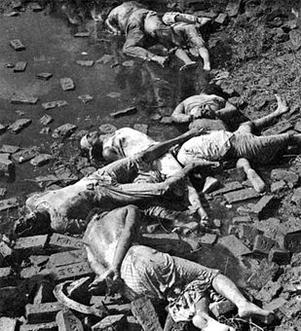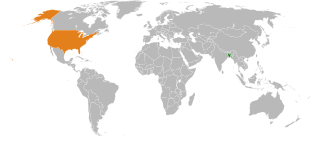
Sheikh Mujibur Rahman, also known by the honorific Bangabandhu, was a Bangladeshi politician, revolutionary, statesman, activist and diarist, who was the founding president of Bangladesh. As one of the founding leaders of Bangladesh, he had held continuous positions, Initially he served as the president of the Awami League, later as the president of Bangladesh, and then as the prime minister of Bangladesh until his assassination in August 1975. His nationalist ideology, socio-political theories, and political doctrines are collectively known as Mujibism.

The Indo-Pakistani war of 1971, also known as the third India-Pakistan war, was a military confrontation between India and Pakistan that occurred during the Bangladesh Liberation War in East Pakistan from 3 December 1971 until the Pakistani capitulation in Dhaka on 16 December 1971. The war began with Pakistan's Operation Chengiz Khan, consisting of preemptive aerial strikes on eight Indian air stations. The strikes led to India declaring war on Pakistan, marking their entry into the war for East Pakistan's independence, on the side of Bengali nationalist forces. India's entry expanded the existing conflict with Indian and Pakistani forces engaging on both the eastern and western fronts. Thirteen days after the war started, India achieved a clear upper hand, and the Eastern Command of the Pakistan military signed the instrument of surrender on 16 December 1971 in Dhaka, marking the formation of East Pakistan as the new nation of Bangladesh. Approximately 93,000 Pakistani servicemen were taken prisoner by the Indian Army, which included 79,676 to 81,000 uniformed personnel of the Pakistan Armed Forces, including some Bengali soldiers who had remained loyal to Pakistan. The remaining 10,324 to 12,500 prisoners were civilians, either family members of the military personnel or collaborators (Razakars).

The Bangladesh Liberation War, also known as the Bangladesh War of Independence and known as the Liberation War in Bangladesh, was an armed conflict sparked by the rise of the Bengali nationalist and self-determination movement in East Pakistan, which resulted in the independence of Bangladesh. The war began when the Pakistani military junta based in West Pakistan—under the orders of Yahya Khan—launched Operation Searchlight against East Pakistanis on the night of 25 March 1971, initiating the Bangladesh genocide.

Archer John Porter Martin was a British chemist who shared the 1952 Nobel Prize in Chemistry for the invention of partition chromatography with Richard Synge.
Archer Kent Blood was an American career diplomat and academic. He served as the last American Consul General to Dhaka, Bangladesh. He is famous for sending the strongly worded "Blood Telegram" protesting against the atrocities committed in the Bangladesh Liberation War. He also served in Greece, Algeria, Germany, Afghanistan and ended his career as chargé d'affaires of the U.S. Embassy in New Delhi, India, retiring in 1982.

The Bangladesh genocide was the ethnic cleansing of Bengalis, especially Bengali Hindus, residing in East Pakistan during the Bangladesh Liberation War, perpetrated by the Pakistan Army and the Razakars. It began on 25 March 1971, as Operation Searchlight was launched by West Pakistan to militarily subdue the Bengali population of East Pakistan; the Bengalis comprised the demographic majority and had been calling for independence from the Pakistani state. Seeking to curtail the Bengali self-determination movement, erstwhile Pakistani president Yahya Khan approved a large-scale military deployment, and in the nine-month-long conflict that ensued, Pakistani soldiers and local pro-Pakistan militias killed between 300,000 and 3,000,000 Bengalis and raped between 200,000 and 400,000 Bengali women in a systematic campaign of mass murder and genocidal sexual violence. In their investigation of the genocide, the Geneva-based International Commission of Jurists concluded that Pakistan's campaign involved the attempt to exterminate or forcibly remove a significant portion of the country's Hindu populace. West Pakistanis in particular were shown by the news that the operation was carried out because of the 'rebellion by the East Pakistanis' and many activities at the time were hidden from them, including rape and ethnic cleansing of East Pakistanis by the Pakistani military.

Robert Vossler Keeley had a 34-year career in the Foreign Service of the United States, from 1956 to 1989. He served three times as Ambassador: to Greece (1985–89), Zimbabwe (1980–84), and Mauritius (1976–78). In 1978–80 he was Deputy Assistant Secretary of State for African Affairs, in charge of southern and eastern Africa.

Bangladesh-United States relations are the bilateral relations between Bangladesh and the United States of America. For the United States, Bangladesh is the 38th largest goods supplier and 60th largest export market. For Bangladesh, the United States is the largest export market. The two countries signed a bilateral investment treaty in 1986. U.S. companies are the largest foreign investors in Bangladesh. The U.S. government is the leading contributor of humanitarian assistance in response to the Rohingya crisis. Both nations have announced similar views for a Free and Open Indo-Pacific.

1971 Dhaka University massacre was the mass murder of students and faculty at the University of Dhaka in East Pakistan by the Pakistan Army, at the beginning of what would become the Bangladesh War of Independence. In March 1971, the Pakistan Army Eastern Wing Commander Tikka Khan launched Operation Searchlight on the orders of Yahya Khan to crush the Bengali nationalist movement. As part of the operation, the army launched an assault on the university campus. It is the deadliest attack on a university in history.
Americans in India comprise immigrants from the United States living in India, along with Indian citizens of American descent. They have a history stretching back to the late 18th century.
During the Bangladesh Liberation War in 1971, members of the Pakistani military and Razakar paramilitary force raped between 200,000 and 400,000 Bengali women and girls in a systematic campaign of genocidal rape. Most of the rape victims of the Pakistani Army and its allies were Hindu women. Some of these women died in captivity or committed suicide, while others moved from Bangladesh to India. Imams and Muslim religious leaders declared the women "war booty". The activists and leaders of Islamic parties are also accused to be involved in the rapes and abduction of women.
Bangladeshi English literature (BEL) refers to the body of literary work written in the English language in Bangladesh and the Bangladeshi diaspora. In academia, it is also now referred to as Bangladeshi Writing in English (BWE). Early prominent Bengali writers in English include Ram Mohan Roy, Bankim Chandra Chatterjee, Begum Rokeya, and Rabindranath Tagore. In 1905, Begum Rokeya (1880–1932) wrote Sultana's Dream, one of the earliest examples of feminist science fiction. Modern writers of the Bangladeshi diaspora include Tahmima Anam, Neamat Imam, Monica Ali, and Zia Haider Rahman.
A. N. M. Hamidullah (1919-1994) born in village somospur, in Srinagar of Munshiganj district was the first governor of Bangladesh Bank, the central bank of Bangladesh. He served during 1972–1974.
Harun-or-Rashid is a Bangladeshi academic. He is a former vice-chancellor of Bangladesh National University.

The Dissent Channel is a messaging framework open to Foreign Service Officers and other U.S. citizens employed by the United States Department of State and Agency for International Development (USAID), through which they are invited to express constructive criticism of government policy.
K.M. Shehabuddin was the first Bangladeshi diplomat, and is known for defecting from the Pakistani Foreign Service before the formation of the Mujibnagar government.
Craig Baxter was an American diplomat, academic, and historian of South Asian history. He was the founder of the American Institute of Bangladesh Studies.
The University Press Limited, commonly abbreviated as UPL, is an academic publishing house based in Dhaka, Bangladesh. UPL was established in 1975 as a successor to Oxford University Press' Dhaka branch where Mohiuddin Ahmed was chief executive. Its success in the publishing industry led to winning the National Book Centre Award 16 times since 1981. UPL is also the first publisher in Bangladesh to export books. As of 2018, UPL has published around 1,500 books.
Fakhruddin Ahmed was a Bangladesh diplomat and former Foreign Secretary of Bangladesh.









